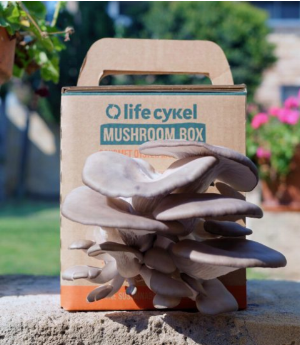Melburnians love café culture. But did you know that coffee grounds end up in anaerobic landfill, unable to decompose, ultimately turning our caffeine consumption into methane emissions? MIC’s newest startup, Life Cykel, is reusing the waste of our urban tastes to create sustainable, high-protein food – mushrooms!
Life Cykel is an environmentally-focused social enterprise that builds urban mushroom farms that run on coffee waste. Good mates Ryan Creed and Julian Mitchell launched this startup to address their shared concerns about the future of food, both in terms of sustainability and food security.
“After researching potential options that were sustainable for the planet and healthy for human consumption, we could not look past mushrooms,” says Julian. “They’re grown from waste and are a perfect substitute for big carbon emitters, such as meat, chicken, pork, and lamb.”
Life Cykel has two products. The first is fresh mushrooms, grown in bulk hanging bags, delivered to local cafes and restaurants the same day the produce is picked. These are grown in shipping containers that have been modified to simulate an environment similar to a cool, damp forest floor. The second product is mushroom boxes for households, which are instead grown in shipping containers modified into warm, dark environments. Every home grown box diverts 60 cups of coffee waste from landfill.
In 2015, the pair successfully raised $30k using Kickstarter to build Australia’s first urban mushroom farm in Fremantle. In 2016, the pair ran their second crowdfunding campaign and successfully raised $31k to expand east and build a mushroom farm in Melbourne.
The two crowdfunding campaigns required an enormous amount of work. Julian’s advice to other startups considering crowdfunding would be to do it. “Crowdfunding enables you to get market feedback, build a community, and bring necessary cash flow without watering down equity,” he says. “To be successful, you must put everything else in your life on hold for 30 days and ensure you have a clear plan. The key lever is getting media coverage.”
This sustainable startup is now a part of Melbourne Innovation Centre. In August, an urban mushroom farm graced the open land at Alphington – and the mushrooms are already growing and being harvested.
“We have been on an exponential learning curve with our business,” Julian says. “One of the key learnings is working with people that get what we are trying to achieve and share a similar vision. After meeting with the MIC team, it became very apparent that this would be a great working relationship. We are grateful to be a part of the startup ecosystem in Alphington.”
For now, Julian and Ryan will feed Australian cities and towns with fresh mushrooms which they call “the most sustainable and ethical source of protein.” This will be done with urban farm production across the country, as well as with their mushroom boxes that enable households to grow mushrooms themselves.
Into the future, the pair has a bigger vision. “The world of fungi has an infinite number of practical applications for a sustainable and smarter future,” Julian explains. “We plan to build the future with mushroom biomaterials that can replace plastics, Styrofoam, and other materials made from fossil fuels and hazardous resins.”
It’s clear that Life Cykel strives to reduce agriculture’s carbon footprint, create sustainable and nutritious food, and deliver social good. In doing so, the startup encapsulates its founders’ values and vision for a smarter, healthier future.



